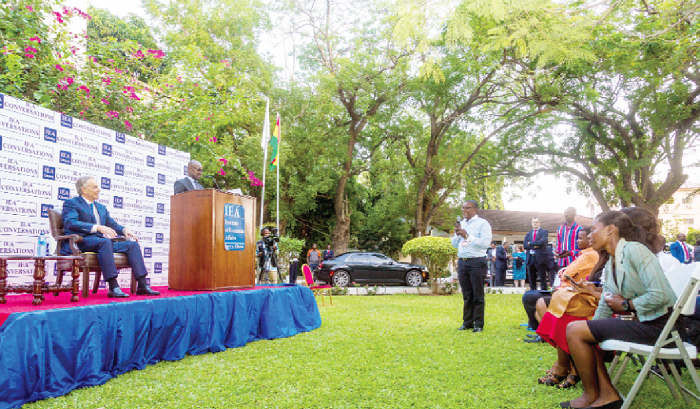
Take advantage of global goodwill -Tony Blair urges Ghana
A former British Prime Minister (PM), Mr Tony Blair, has urged Ghana to take advantage of the tremendous goodwill it is currently enjoying globally to spur accelerated growth and development.
What was important, the former Premier opined, was for the country to set its development priorities right to come out of the prevailing challenges.
Mr Blair, who made the call during an interaction with the media in Accra last Tuesday, said Ghana, like other countries, had challenges and it was necessary for the country to take difficult decisions and choices to overcome them.
“Right now, Ghana has big challenges — challenges around the budget deficit, challenges around the power sector, challenges around agriculture, education, industrialisation,” he said.
The former UK Premier had earlier engaged with stakeholders on: “Governance and Development’’ at the Ambassador Birgit Storgaard Dialogue Centre at the Institute of Economic Affairs (IEA) in Accra.
Background
Mr Blair became Prime Minister in 1997 and was leader of the UK at the age of 44. He served in that capacity for a decade.
Since leaving office in 2007, he has used his African Governance Institute (AGI) to support and improve governance on the African continent.
He was in the country with his AGI at the invitation of the IEA to see how they could support Ghana in its new stage of development.
Success lies in your hands
Mr Blair urged Ghanaians to take the development of the country into their own hands, instead of putting their hopes on aid.
“The developed world can help, but ultimately your success lies in your hands. You will make your country succeed; no one else can be substituted for that,” he said.
Bold decisions
He urged the new government to be bold to pull the country out of the prevailing challenges by taking difficult decisions.
While emphasising that tough economic times demanded tough decisions, he said Ghana's quest to overcome the enormous challenges and spur growth and development was not going to be a tea party.
"This country has huge potential. It’s got resources that it can develop and exploit. What is necessary to set the country on the right path is to take difficult decisions and improve the lives of the people.
“Today we must look at how we put our own destiny into our own hands,” Mr Blair stated, adding: "Whatever the challenges, there is the genuine opportunity if the correct decisions are taken."
Good governance
He said Ghana could learn the lessons of good governance around the world, stressing, for instance, that there was the need to fight corruption with all seriousness.
He also spoke about the need for the country to improve trade with its neighbouring countries, as well as the global community.
NEPAD
On the New Partnership for Africa’s Development (NEPAD), Mr Blair underscored its importance and stated that it must be developed further.
“NEPAD was good and we need to take the concept forward,” he stated.
Globalisation and change
Touching on globalisation, he said there was general anxiety in the world today over the pace of change and globalisation.
Drawing similarities between change and globalisation, he said: “With globalisation comes economic change. The answer to globalisation is not to shut the world down. We should open it up to help people through the process of change. That is why issues like education, skills and infrastructure are important. That is why, here in Ghana, your new President has made education a big priority.”
He challenged the government to help the people through the process of change.
He said ‘change’ was good for the development of every society, adding: “So I get worried when people get frightened by change.”
This is the second time Mr Blair is visiting Ghana. The first was when he was prime minister.
Age factor immaterial
Even though he became prime minister at a relatively young age, Mr Blair said he was not keen on the age factor in leadership.
He shot down arguments that Africa needed to set a limit to the terms of office for its leaders and determine the age range within which people could become President.
According to him, age was not important in governance, but experience was key to be effective as a leader.
He emphasised that the will of the people should be made paramount and, therefore, whoever the citizens wished to lead them as President should be allowed to lead.
The former PM noted that despite the fact that youthful leaders were more energetic, it was essential that Africans chose the best people to serve as Presidents.
“I actually think you should elect the best person, whether he or she is younger or older. With youth can come vigour, but with it should be experience. The best is to have vigour and experience. I don’t favour the age limit; I favour the right of the people to decide and they should decide on the basis of the best person, whatever their age, whatever their gender,” he said.
